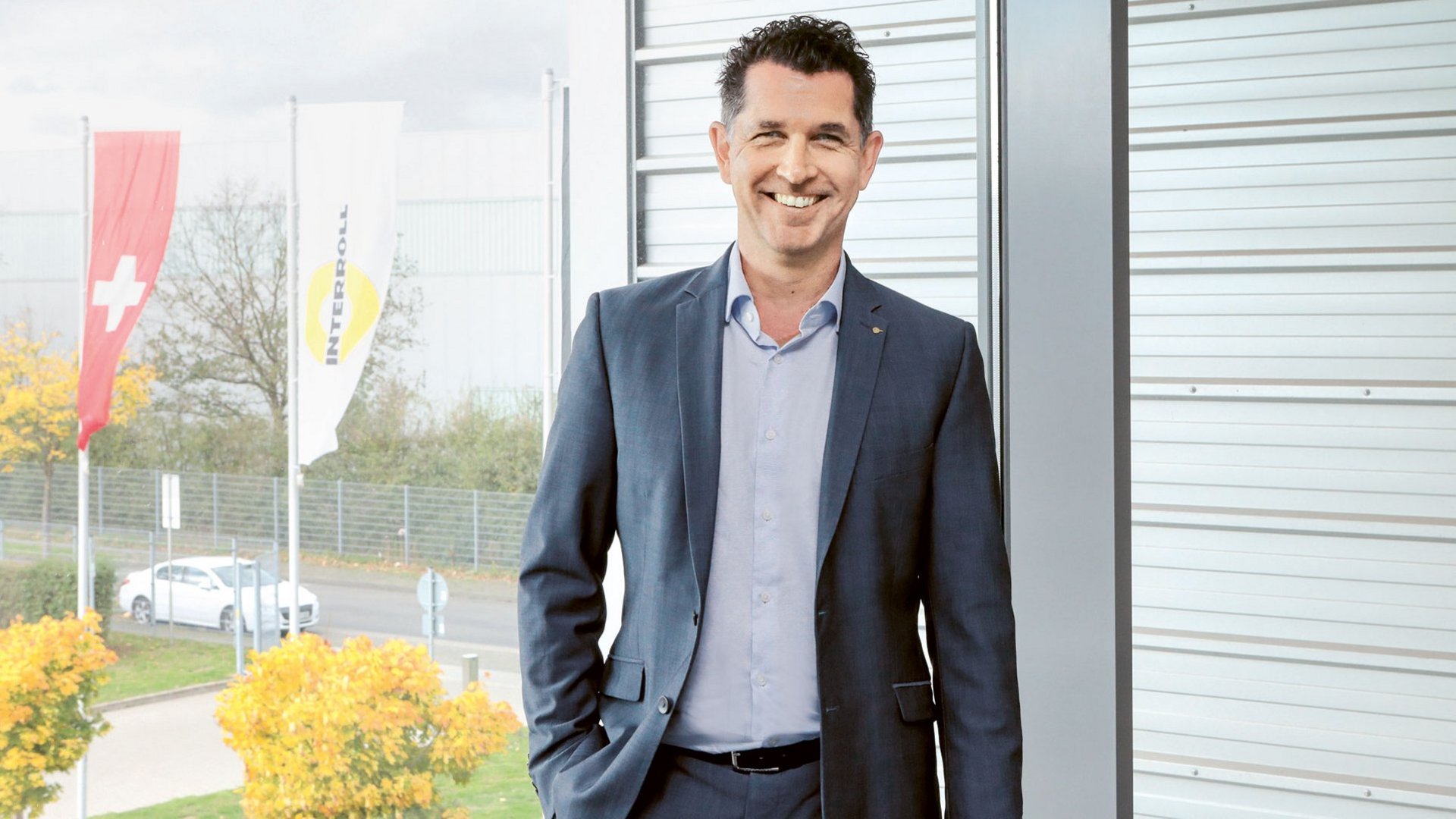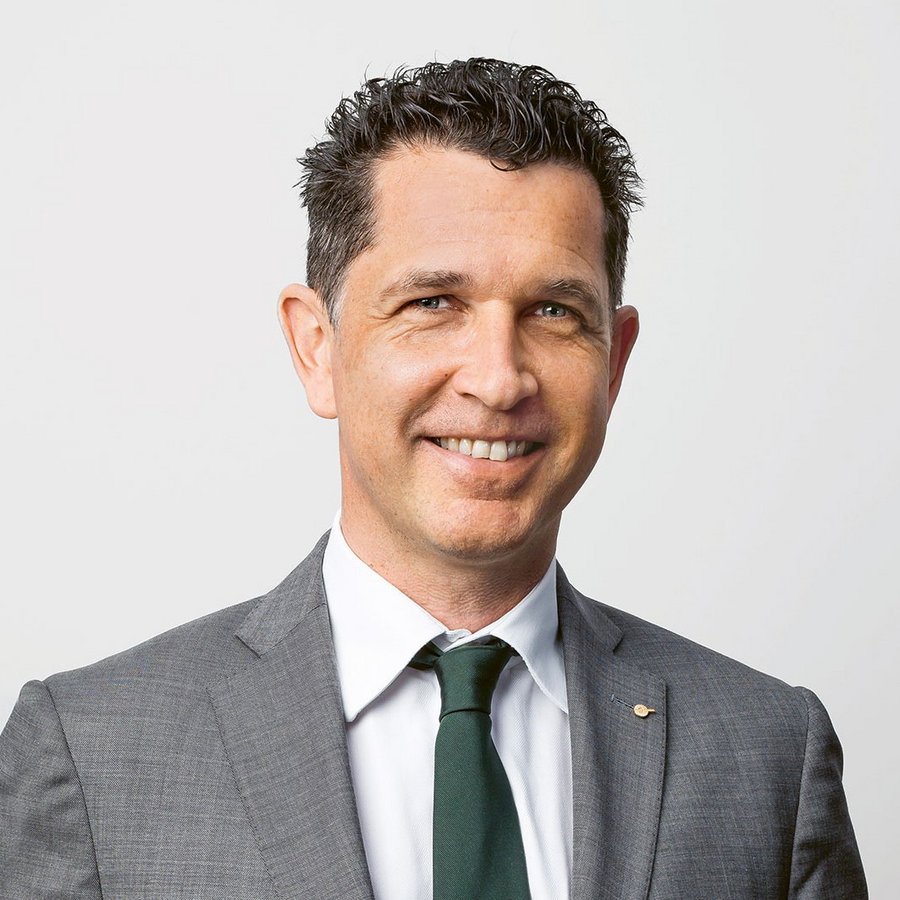An authority to be listened to
19.03.2021
Interview as PDF
2020 was an exceptional business year that was an acid test for Interroll’s performance – and for its relationship with its customers. An interview with Jens Karolyi, Senior Vice President Corporate Marketing & People Development of the Interroll Group, about responsibility in times of crisis, swimming against the current and the emotional dimension of the brand.

Mr Karolyi, the COVID-19 pandemic hit the world economy very suddenly and with full force last year. How has Interroll dealt with this crisis?
Jens Karolyi: Only in a crisis does it become apparent whether the business orientation and value compass of a company really work. In this respect, the COVID-19 pandemic has also put Interroll to the test. Our key financial figures prove that we have mastered this particular challenge over the past year. However, this stress test goes far beyond our operational performance. It also affects the values by which companies align themselves. At the beginning of the crisis, for example, the fundamental question for us was whether we should just take the plunge; in other words, wait and see what other companies do or live up to our responsibility as a global industry leader. So the challenge is: Is responsibility just lip service for fair weather or is it really an integral part of our thinking and actions? Events such as the financial or COVID-19 crisis quickly become a litmus test for companies.
And what exactly did this acid test last year look like?
A good example was LogiMAT in Germany, the world’s most important trade fair for Interroll, which was to take place in mid-March 2020 – at a time when the number of fatally ill people was already rising, especially in Italy, and the first frightening pictures were being sent around the world. More than 60.000 international visitors were expected in the exhibition halls at the time. Today, one would probably say: a potential superspreading event. Practically all sides, i.e. authorities, organizers and exhibitors, tried to hold on to the fair – which was no wonder given the economic implications of a cancellation. But we swam against the current: Out of a sense of responsibility for our customers and employees, we were the first industry giant to cancel our participation. This was based on a quick decision by our Group Management, which required courage – and became a role model. Shortly afterwards, almost all exhibitors joined us in this step, which finally forced the organizer to officially cancel the trade fair.
What does this experience mean?
Our approach showed that we not only have lean decision-making structures, but that our compass is also right. It also showed that our technological and business performance is not the only thing that is now being perceived in the industry. People look at how we behave and what our attitude is. So we are well on the way to becoming an authority whose opinion is taken very seriously, beyond daily issues. This is not only a good sign, but also an obligation for the company.
In what way?
Because we must not disappoint this leap of faith that we have earned over many years as a neutral provider of material flow solutions. Our attitude – also and especially when it comes to future questions – must therefore always be well-founded so that customers and users can understand it. In this role, we will not be forgiven for rash decisions and an opportunistic zigzag course.
And in what areas could this changed role have an impact?
First of all, wherever our industry needs to be clear about common concerns. One example is overdue questions on international standardization, for example when it comes to defining communication and data standards in smart logistics. Here we should and can have a say – especially in the interests of our customers. And not only through our own expertise, which we have expanded in research and development, for example, but also on the basis of the exchange of experience with our international partners in the Rolling On Interroll network. The aim here is to stimulate and support appropriate discussions and to make the professional expertise and market knowledge of the global SME sector heard.
Does this self-image also have an impact on the positioning of the brand?
Yes. What we see in the development described above is that emotional aspects are becoming increasingly important in the external perception of our brand promise, which encompasses speed, quality and experienced simplicity. In future, it will therefore also be a question of not only fulfilling the rational demands placed on us. Anyone who relies on Interroll technology should do so in the knowledge and with the confidence that they can rely on us 100 percent. In other words, they simply have to feel good about having Interroll as a competent partner at their side.
However, this requires close communication with the customers. How did you respond to the lockdowns of the first wave of infection?
Instead of licking our wounds and shutting down our activities, we proactively stepped on the gas pedal. Visits to customers and even our own trips to our locations were no longer possible. There was great uncertainty among customers, users and employees. Would there be plant closures? What would the hygiene rules look like? Would we continue to work on orders? Were orders still possible at all? So they wanted to know rightly: How does Interroll behave in the crisis? To answer this question, we quickly set up a live stream with the managers responsible for Europe, America and Asia, which met with great interest from our customers and employees. Afterwards it was clear that Interroll will not let anyone down in the crisis and will face up to its special responsibility.

Anyone who relies on Interroll technology should do so in the knowledge and with the confidence that they can rely on us 100 percent.”
And how did you try to compensate for the cancelled trade fairs?
Even before we cancelled LogiMAT, we were of course already looking intensively at alternatives. So we were able to use the cancellation of the fair as a momentum. We were the first in the industry to set up our own “trade fair” on the Internet and offer it to visitors from all over the world. The spectrum of topics ranged from multimedia product presentations via live stream with chat function to videos with expert tips and completely interactive webinars. Customers were given the opportunity to ask questions and network directly with the relevant product and sales experts. Some of these presentations were then produced not only in English or German, but in 17 languages. The demand was extremely high – also because many customers were sitting in their home office themselves and could thus easily satisfy their professional information needs. During this time, the traffic on our website increased fivefold and we were able to generate up to 700 customer contacts per day.
So this was an important tool for sales?
Absolutely. This has certainly helped the sales staff a lot to look after existing and prospective customers. But in the end, this measure was also an important test of the values and attitudes that we have been addressing in the training programs of the Interroll Academy over the past few years. These international training sessions are, after all, among other things about sensitizing managers from a wide range of different areas to the need for seamless cooperation across departmental boundaries. And this is exactly what we have been able to demonstrate here in the digital world through the interaction of marketing, sales and product management. Everyone involved really pulled together and did an outstanding job.
Will digital communication continue to occupy a larger place in marketing in the future?
Yes. The boost that the COVID-19 crisis brought has only accelerated current trends. What was not expected for two years is now a matter of course. We will use this development to further intensify the relationship with our customers. One example is digital surveys, which will give us a comprehensive insight into our own performance and serve as an early warning system so that we can quickly make adjustments if necessary.
Have digital marketing instruments made future trade fair participations obsolete?
No. Digital channels certainly cannot completely replace personal contact. However, we are taking a close look at where and under what circumstances it still makes sense to participate in a trade show. But we are also open to new approaches in this area. We believe that it can be more effective in the interest of our customers if we simply stop by with our solution portfolio. For this reason, we plan to visit European customers on site with a mobile truck show. This will enable us to present our solutions and product innovations in a clear and even more targeted manner. This trade fair concept is not only flexible and efficient, but would also easily allow us to maintain the highest hygiene standards.